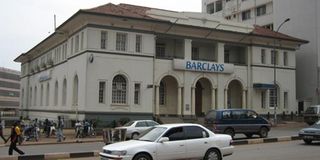Barclays exiting Uganda

Barclays Bank Uganda main branch along Kampala road
Barclays Bank Plc is Tuesday expected to announce its plan to partially or wholly exit Africa, according the Financial Times, quoting sources close to the matter.
The Financial Times on Friday reported that Mr Jes Staley, the former JPMorgan Chase executive, who took over as Barclays Group chief executive officer in December will announce the decision after studying a review of the bank’s operations in Africa that was concluded in December last year.
The review, which highlights Africa’s fading fortunes resulting from sinking oil prices, falling commodity prices and the heavy depreciation of the South African Rand, will be a key point to buttress Mr Staley announcement.
Mr Staley is also, via a teleconferenced briefing, expected to update journalists on the bank’s financial performance for the year ended December 31, 2015.
Asked about the matter, Mr Webster Malido, the Barclays Africa head of regional communications could not deny or confirm the reports but told Daily Monitor in an email that “we don’t comment on market speculation”, however he said for the sake of context “we are a well-capitalised and independently funded business and control the African operations.”
The poor performance of the South Africa Rand, which could be the basis of the bank’s decision, has heavily depreciated over the last year, falling by more than 25 per cent blamed on a volatile mining sector and falling credit rating for the South African economy, one of the bank’s largest and most affluent markets.
The move is likely to end the bank’s near century relationship with Africa spread in 12 markets including Uganda, Kenya, Tanzania, Botswana, Ghana, Mauritius, Mozambique, Seychelles, South Africa, Zambia, Egypt and Zimbabwe.
The group, which also has representative offices in Namibia and Nigeria has a holding portfolio of SAR991b (Shs205.5 trillion), 40,000 staff and a network of 1,267 branches on the African continent.
It is not yet clear who will take over the operations as Barclays declined to comment on the matter.
Barclays Plc, based in the United Kingdom, hold a 62.3 per cent stake in the African operations, which was substantially expanded with the acquisition of the Absa Group Limited in July 2013.
In Uganda, where Barclays is a holding company for Barclays Bank Uganda, Ms Barbara Kanyana Kamugisha, the head of marketing declined to comment on the matter but said: “We remain committed to serve our customers across all channels in the best possible manner.”
In 2006, Barclays Bank acquired Nile Bank at an estimated Shs29b, increasing its branch network from seven to 25 then.
However the bank has since expanded its reach to 42 branches and a service extension of 71 ATMs spread across the country.
On the whole, Barclays Plc has been struggling to shake off a scandal in which it was fined $250b (Shs890 trillion) for conniving to offer bogus information with a view of skewing the setting of the London Interbank Offered Rate in its favour.
Barclays, according to findings duped the banking sector by setting rates below the market value as it sought to unfairly increase its revenue.
Mr Bob Diamond, who was the bank’s chief executive officer then, was sacked.
London Interbank Offered Rate is the average of interest rate estimated by each leading banks in London that it would be charged were it to borrow from other banks.



